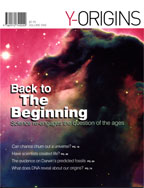LUCKY YOU
Some materialists attribute the fine-tuning of the universe to chance. In Alpha & Omega, Charles Seife summarizes how some view the fine-tuning: “It seems like a tremendous coincidence that the universe is suitable for life.”1
Cosmologists Bernard Carr and Sir Martin Rees state in the journal Nature, “Nature does exhibit remarkable coincidences and these do warrant some explanation.”2 In a later article Carr comments, “One would have to conclude either that the features of the universe invoked in support of the Anthropic Principle are only coincidences or that the universe was indeed tailor-made for life. I will leave it to the theologians to ascertain the identity of the tailor.”3
In other words, as a scientist, I don’t get into religion, so I assume it was all a lucky break. Scientists who subscribe to a materialistic world view simply can’t bring themselves to accept the intervention of an intelligent designer who orchestrated the creation of the universe. Therefore, faced with all the evidence for fine-tuning, they default to the position that it was all just a coincidence.
There is, however, a defense often raised by those who take the viewpoint that life, and the fine-tuning of the universe, are just amazing coincidences. It goes like this: Whatever shape the universe took, one could look at the sequence of events and say that it was just as unlikely that the universe should have developed in that way.
In other words, every state of affairs, from a certain viewpoint, has astronomical odds of its eventuating just the way it did. So why should we really be amazed that we won life’s cosmic lottery? Somebody had to.
Let’s consider how I lived out my day today as an example of this line of thinking:
What are the odds that I would have gone to the post office, as opposed to the grocery store or Blockbuster, and purchased 18 stamps instead of 20 or 30?
What are the odds I would have received a phone call, rather than an e-mail, from my friend Jeff?
What are the odds I would have eaten—today of all days—hot dogs for dinner, when I could have eaten so many other dishes that didn’t contain beef hearts?
By the time you get to the end of the day, the odds of my living out my day in exactly this way, as opposed to others, would be rather large. I could get to the end of the day and scratch my head in amazement at the chain of events that have led me to my current sprawled position on my sofa staring at my computer screen—Gee, what are the odds?
This is a neat magic trick done with odds, and the inventor of it has a bright career ahead of him as a pollster in politics. Calculating the odds for a particular sequence of ordinary events like my day’s circumstances after they occur is no different than predicting the winner of a race after it is over. But looking back on a finely-tuned universe and assigning probabilities of it having occurred by chance is totally different. The two scenarios are different as apples and oranges.
In order to calculate the odds against our being here, over a hundred parameters must be balanced on a razor’s edge. If just one of them was off by just a slight degree, you wouldn’t be reading this.
Back | Endnotes | Next
|




